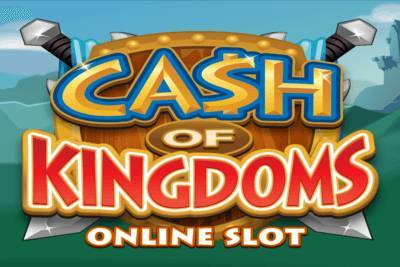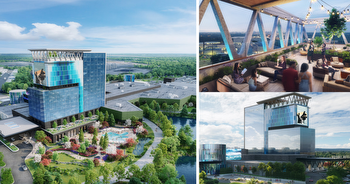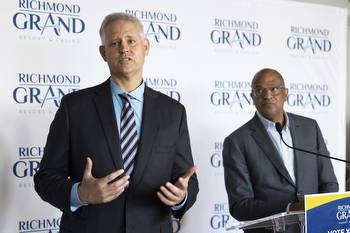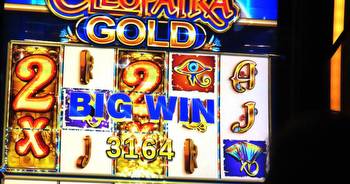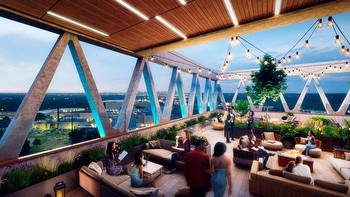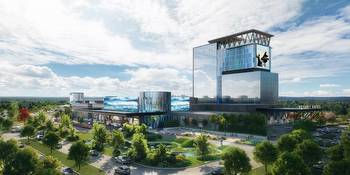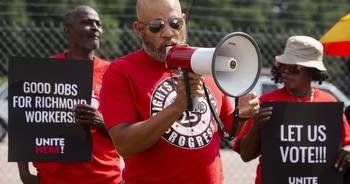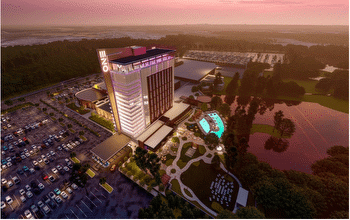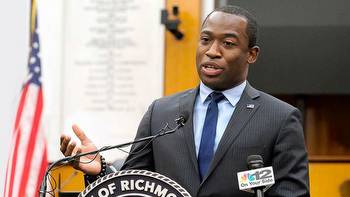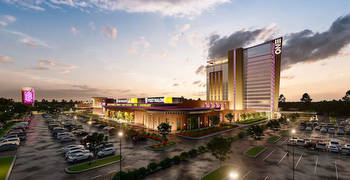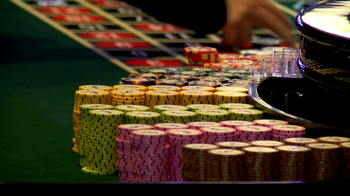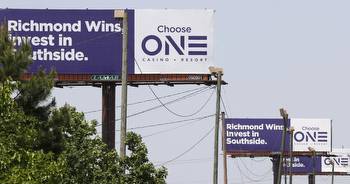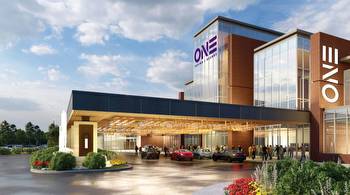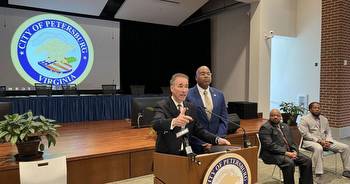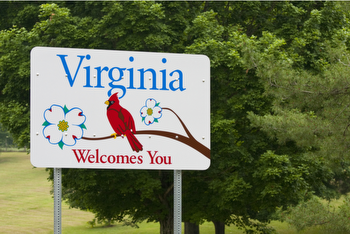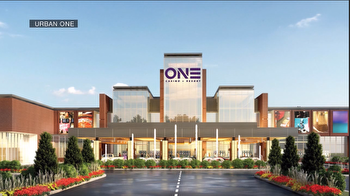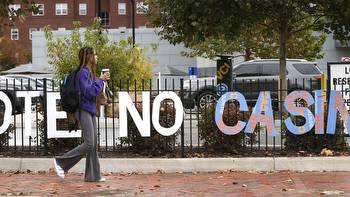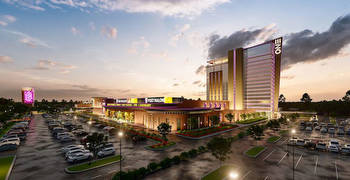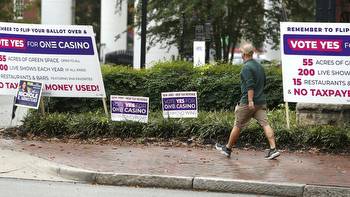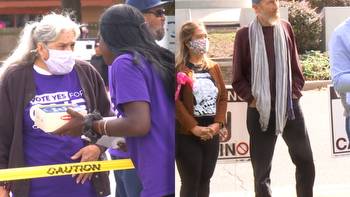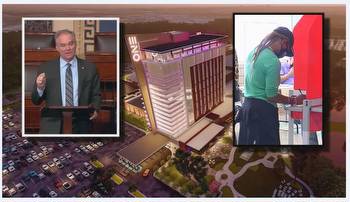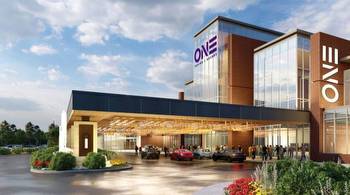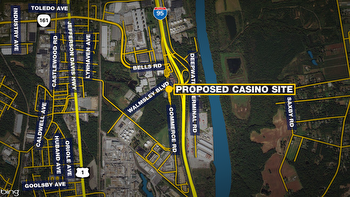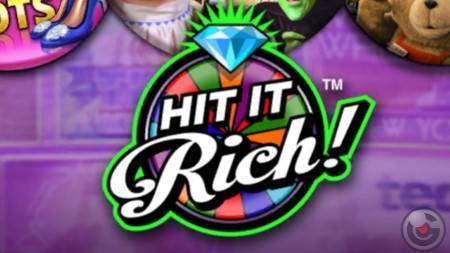Breaking down Richmond’s (second) casino referendum
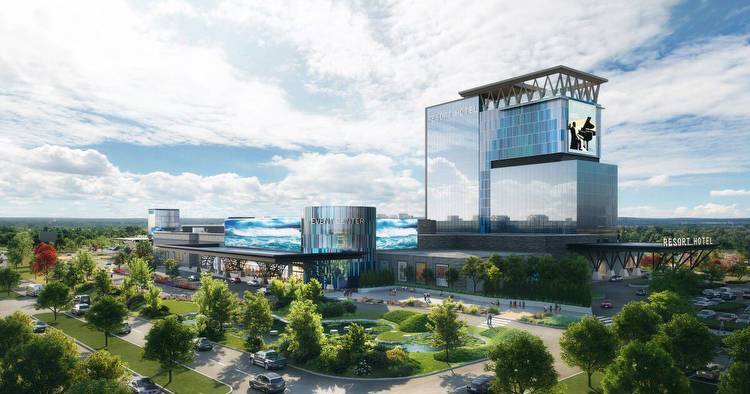
Outside of the early voting site at Hickory Hill Community Center, a food truck’s generator buzzed as a worker hands out food. More buzz came from campaigners promoting support for the casino referendum on the ballot.
“Vote jobs and revenue, revenue! Vote jobs and revenue!” sang two women as they directed people toward the polls or the food truck, which gave out free meals to anyone who queued up.
Richmond City voters are deciding whether a new casino and entertainment venue, and the possible gains in tax revenue and jobs by that come with it outweigh concerns over transparency, policymakers’ respect for a 2021 defeat of a similar measure and the risks expanded gambling could pose.
Urban One and Churchill Downs are behind the Richmond Grand Resort & Casino, which is expected to be built in the Southside industrial area by May 2026. The whole facility, which will include a publicly accessible 55-acre park, restaurants, a concert venue and media production studio, will be completed in May 2029. The companies have promised to employ at least 1,300 people.
In 2021, voters rejected a very similar but not identical proposal by a narrow margin. Despite being outspent $2.6 million to $231,000, voters split 51% to 49% against a casino, a margin of less than 1,500 votes.
Jobs and labor
At Hickory Hill, Dorothy Forbes said she had already voted for the casino — twice: once in 2021 and again this year. The Southside resident worked for Philip Morris before she retired 35 years ago. Forbes said she frequents casinos in other states, chartering buses with a social club of hers. She came to bring her cousin to vote.
“So we can win this time. We gonna win,” she said. “I'm voting for the casino for better jobs. They say they have better jobs and opportunity for people to work.”
The agreement between the hopeful casino owners and the city outlines a project in which there are a minimum of 1,300 direct hires, paid at least a hourly minimum wage of $15 with an average compensation package of $55,000. Third-party vendors at the casino would hire at least 200 people, according to the lottery board filings.
Organized labor has thrown its support behind the casino, as well. Richmond Area Building and Construction Trades Council reached a project labor agreement more than a month ahead of the referendum’s final outcome, according to a Sept. 26 press release. Unite Here, a hospitality workers’ union, signed a Labor Peace Agreement, which sets “a fair process to decide on unionization when Richmond grand opens its doors.”
Charles Skelly, president of the Richmond Building and Construction Trades Council, said estimates that the construction of the casino could create 2,000 jobs are not unreasonable.
Workers and organizers with Unite Here have packed community meetings, rehearsing questions to ask officials and the casino’s boosters beforehand, and protested outside of a local bingo hall that sued to keep the referendum question off the ballot. The union projects their members will have knocked on 100,000 doors before polls close on Nov. 7.
“With the labor peace agreement for the operations and the project labor agreement for the constructions sets the framework for these to be very good jobs,” Skelly told VPM News. “These aren’t just junk jobs.”
The labor groups’ agreements with the prospective casino investors differ from the 2021 election, although other organized labor supported the 2021 casino referendum.
Revenue
That's what brought David O’Barry out to vote again this year.
“We enjoy the tax revenue from alcohol sales. Why shouldn't we enjoy the tax revenue from casino gaming?” he said. “I mean, everybody's screaming for more money.”
The city said if the casino’s built, it expects $30 million in annual tax revenue, based off of a study by the Convergence Strategy Group.
The number is based off CSG’s estimates that a Southside casino would generate $309.2 million in annual gaming revenue, while the developers said it would be $340.4 million. New casinos in Danville and Bristol have outstripped their revenue expectations, as reported by the Virginia Mercury. But as gaming expands across the commonwealth, as it has steadily over the past five years, those could decline as more facilities open.
Businesses involved in Dumfries or Prince William County casino gaming establishments would have to pay a “mitigation payment” if they cut into Richmond’s gaming revenues, according to filings with Virginia Lottery. Churchill Downs already operates a Rosie’s gaming facility in Dumfries and is planning another one in Manassas Park City. Technically, Rosie’s is not a casino gaming establishment, according to a Churchill Downs spokesperson.
While not binding, a Richmond City Council resolution promises to allocate gaming revenue child care and parks, including a $25.5 million payment from the developers and another $1 million after financing concludes.
From the upfront payment, $14 million would go to new early childhood care centers at T. B. Smith Community Center and Southside Community Center. The city’s Parks & Recreation and Community Facilities projects would get $8 million. A new Child Care and Education Trust Fund would receive $4.5 million from the upfront payment, and each year it would get up to $19 million from the casino’s expected gaming taxes.
The remaining projected $11 million would go into the city’s general fund.
There developers have also promised millions in other perks for the city: a 3% portion of adjusted gross receipts to the city for a minimum of $5 million, spending $25 million on media advertising, and $50 million in production spending in the city. It’s also promised $16 million in charitable giving over the next 10 years.
Gambling
The Joint Legislative Audit and Review Commission, the General Assembly’s research and oversight agency, conducted a report in 2019 evaluating potential Virginia casinos. It cited national studies showing 5% to 10% of adults are at risk of gambling addiction. That’s 10,000 to 20,000 people in Richmond, where residents are expected to contribute about 22% of the facility’s revenue.
Problem gambling specialty treatment cost an average of $1,642 in 2021 per client treatment episode, according to the National Association of Administrators for Disordered Gambling Services. But the cost to enroll a new person is closer to $3,750 in allocated treatment dollars — the amount needed to get new patients through the door, processed and treated.
While the JLARC study stops short of directly connecting new casinos and increased problem gambling, another study said that people in poorer neighborhoods or those close to a casino were at higher risk for problem gambling.
Between 2022 and 2018, when state lawmakers began expanding gambling, the Virginia Council of Problem Gaming helpline saw an 800% increase in calls, Carolyn Hawley, president of the Virginia Council on Problem Gambling, recently told Radio IQ. The VCPG’s annual report said that between 2021 and 2022 it increased 56%. It listed slot machines as driving the most calls.
“I've worked around a lot of people who are addicted to gambling, and it's not fun,” said Lanno Raine, a tattoo artist walking her dog near the Virginia Capitol, who said she would vote no.
A portion of taxes from gaming and gambling need to go toward problem gambling services, according to state law. The casino operators have promised an additional $200,000 each year to fund mental health professionals and resources to prevent and treat problem gambling, Michael Kelly, a spokesperson for Churchill Downs, wrote in an email.
Shall casino gaming be permitted at a casino gaming establishment in the City of Richmond, Virginia, at 2001 Walmsley Boulevard and 4700 Trenton Avenue, Richmond, Virginia 23234 as may be approved by the Virginia Lottery Board?
— Richmond City ballots
Democracy
Three months after the 2021 defeat, City Council started the legal process of getting the casino on the ballot again. Then budget language prevented Richmond from voting on the casino in 2022, but the city pressed forward for 2023.
“From my POV, I don't think it's going to be passed again. I think one ‘no’ was enough,” said Jasmine Cobb, who said she has campaigned against the casino. “I think this is like a Hail Mary,”
The pro-casino political action committee has raised $8.1 million, between in-kind donations and funds: $4 million from Urban One and $3.1 million from Churchill Downs. These make up some of the largest single political donations ever in Virginia, including the two largest corporate donations.
Virginia’s campaign finance laws, which place few limits on the size of political donations, also made undecided voter Michael Means uneasy.
“They're spending so much money. It gives me pause if they're willing to spend that much money, just to bring it here. I'm just like, ‘Well, how much money is gonna stay in the community?’” said Means, who voted against the casino in 2021, while recently walking down Cary Street.
Spokespeople for Mayor Levar Stoney and the City of Richmond didn’t answer an email requesting a description of differences between the 2021 and 2023 referendums.
Michael Kelly, a spokesperson for Churchill Downs, wrote in an email that “Richmond Grand is a new project and new opportunity.” While Churchill Downs is a new partner, most differences Kelly pointed to were related to the campaign efforts and other engagement: the project labor agreements, community engagement meetings and the rebrand to Richmond Grand, which elevates the project’s resort offerings rather than the casino.
Transparency
Opponents also have problems with the project’s transparency. Despite some changes, including the addition of Kentucky-based Churchill Downs as an operator, Richmond didn’t conduct a public bidding process like it did in 2021. That led to an unsuccessful lawsuit by charitable gaming operators.
“It was supposed to be a bid contract for this casino. It didn't happen,” said Chuck Lessin, who owns a building rented by Richmond Lodge No. 1 of the Good Lions Inc., the suit’s plaintiffs. “I'm proud of my tenant for filing the suit.”
Financial transparency around the companies also have raised questions. The lottery board filings list “local” investors as putting up $10 million of capital, but it doesn’t detail who they are. Kelly said the two companies plan to offer local partners an opportunity to invest, but no investment offering has been made yet.
Urban One is multiple quarters behind on financial disclosures — to the point that last month the Nasdaq Stock Market began the process of removing it from the index. In a recent press release it said those delays have been furthered by errors around its investments in RVA Entertainment Holdings, LLC, the vehicle by which it and Churchill Downs are developing the casino.
The delisting could have implications for financing, though Urban One CEO Alfred Liggins previously told VPM News that the two companies are able to pay for the project independently. Virginia Lottery filings indicate that most of the project would be financed using debt.
Prior to the delisting announcement, Churchill Downs CEO Bill Carstanjen has said financing specifics would be announced after the Nov. 7 referendum.
What happens with a yes or a no?
If Richmond votes yes, construction is expected to begin within 12 months and complete in 30 months, Kelly said. The city will receive the upfront payment of $25.5 million, and once financing closes it will pay another $1 million.
But if Richmond votes no for the second time, it's unclear whether it would be brought onto the ballot a third time. When asked if Stoney would bring it to the ballot again if faces with a loss, Gianni Snidle, a spokesperson wrote the following:
“Right now Mayor Stoney is focused on informing Richmonders about how the Richmond Grand will fund the Child Care and Education Trust Fund, provide 1,300 good paying union jobs, and create a new world-class entertainment venue with green space, new restaurants and bars — a game changer for Southside and Richmond as a whole.”







